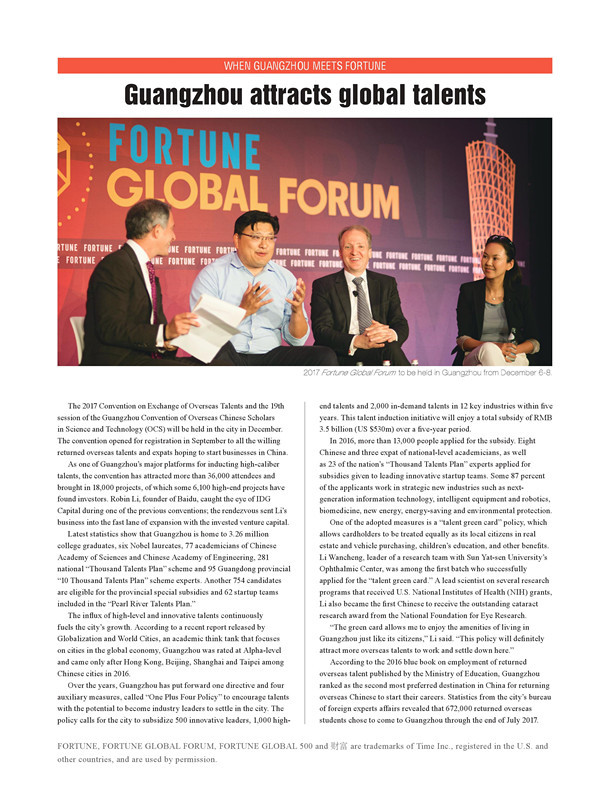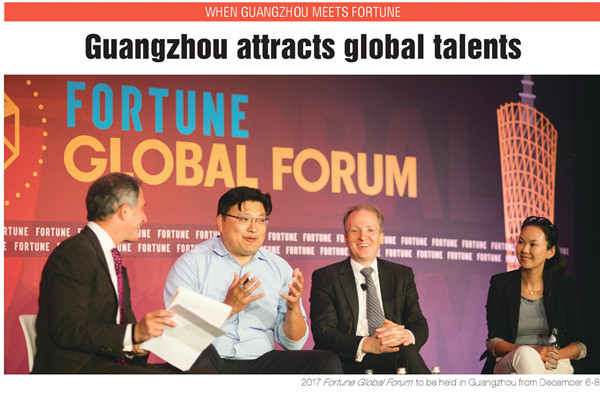The 2017 Convention on Exchange of Overseas Talents and the 19th session of the Guangzhou Convention of Overseas Chinese Scholars in Science and Technology (OCS) will be held in the city in December. The convention opened for registration in September to all the willing returned overseas talents and expats hoping to start businesses in China.
As one of Guangzhou’s major platforms for inducting high-caliber talents, the convention has attracted more than 36,000 attendees and brought in 18,000 projects, of which some 6,100 high-end projects have found investors. Robin Li, founder of Baidu, caught the eye of IDG Capital during one of the previous conventions; the rendezvous sent Li’s business into the fast lane of expansion with the invested venture capital.
Latest statistics show that Guangzhou is home to 3.26 million college graduates, six Nobel laureates, 77 academicians of Chinese Academy of Sciences and Chinese Academy of Engineering, 281 national “Thousand Talents Plan” scheme and 95 Guangdong provincial-level “10 Thousand Talents Plan” scheme experts. Another 754 candidates are eligible for the provincial special subsidies and 62 startup teams included in the “Pearl River Talents Plan.”
The influx of high-level and innovative talents continuously fuels the city’s growth. According to a recent report released by Globalization and World Cities, an academic think tank that focuses on cities in the global economy, Guangzhou was rated at Alpha-level and came only after Hong Kong, Beijing, Shanghai and Taipei among Chinese cities in 2016.
Over the years, Guangzhou has put forward one directive and four auxiliary measures, called “One Plus Four Policy” to encourage talents with the potential to become industry leaders to settle in the city. The policy calls for the city to subsidize 500 innovative leaders, 1,000 high-end talents and 2,000 in-demand talents in 12 key industries within five years. This talent induction initiative will enjoy a total subsidy of RMB 3.5 billion (US $530m) over a five-year period.
In 2016, more than 13,000 people applied for the subsidy. Eight Chinese and three expat of national-level academicians, as well as 23 of the nation’s “Thousand Talents Plan” experts applied for subsidies given to leading innovative startup teams. Some 87 percent of the applicants work in strategic new industries such as next-generation information technology, intelligent equipment and robotics, biomedicine, new energy, energy-saving and environmental protection.
One of the adopted measures is a “talent green card” policy, which allows cardholders to be treated equally as its local citizens in real estate and vehicle purchasing, children’s education, and other benefits. Li Wancheng, leader of a research team with Sun Yat-sen University’s Ophthalmic Center, was among the first batch who successfully applied for the “talent green card.” A lead scientist on several research programs that received U.S. National Institutes of Health (NIH) grants, Li also became the first Chinese to receive the outstanding cataract research award from the National Foundation for Eye Research.
“The green card allows me to enjoy the amenities of living in Guangzhou just like its citizens,” Li said. “This policy will definitely attract more overseas talents to work and settle down here.”
According to the 2016 blue book on employment of returned overseas talent published by the Ministry of Education, Guangzhou ranked as the second most preferred destination in China for returning overseas Chinese to start their careers. Statistics from the city’s bureau of foreign experts affairs revealed that 672,000 returned overseas students chose to come to Guangzhou through the end of July 2017.



















